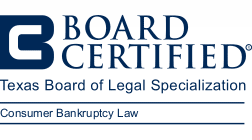How Do You Pass the Means Test?
 Chapter 7 bankruptcy gives certain qualifying debtors the opportunity to get a financial fresh start by discharging much of their qualifying debt. It also has many benefits, including the fact that it is a relatively short process lasting only four to six months. Additionally, debtors also get to keep several important assets that are exempt from the bankruptcy estate. However, you must qualify for Chapter 7 by passing the means test, an income calculation used to determine eligibility to file for Chapter 7. An experienced Harris County, TX Chapter 7 bankruptcy attorney can offer advice on the requirements for passing the means test.
Chapter 7 bankruptcy gives certain qualifying debtors the opportunity to get a financial fresh start by discharging much of their qualifying debt. It also has many benefits, including the fact that it is a relatively short process lasting only four to six months. Additionally, debtors also get to keep several important assets that are exempt from the bankruptcy estate. However, you must qualify for Chapter 7 by passing the means test, an income calculation used to determine eligibility to file for Chapter 7. An experienced Harris County, TX Chapter 7 bankruptcy attorney can offer advice on the requirements for passing the means test.
What Is the Means Test?
To qualify for Chapter 7 bankruptcy, your income cannot exceed a certain income ceiling. This policy is in place in order to ensure that people do not take advantage of Chapter 7 bankruptcy and that only those who do not have enough income to pay their creditors can file. The calculation used for determining whether your income is below the Chapter 7 income threshold is called the means test.
How Do You Pass the Means Test?
In the first part of the means test, you will calculate your gross income. If it is lower than the Texas median income, you pass. If it is not, you will move on to the next step, which is determining whether your "disposable income" is below a certain amount. To calculate your disposable income, the means test deducts certain expenses from your monthly income to arrive at the value of your disposable income, including:
-
Home or car payments: Any monthly payments on secured debt, such as your home mortgage, can be deducted from your income if you intend to keep the property and are current on payments.
-
Taxes: Mandatory payroll deductions (like income tax and Social Security) are allowed, but overdue tax payments must meet specific conditions to qualify as deductions (such as being part of an installment agreement).
-
Child care: If you have reasonable child care payments such as daycare or babysitting, these will also typically be subtracted from your income.
-
Healthcare expenses: If you have healthcare costs above and beyond the national average that exceed the IRS local standards, you can often deduct those.
-
Charity: Donations to charity that you made consistently and regularly before bankruptcy and will continue to make after bankruptcy can generally also be deducted if they do not exceed 15 percent of your gross income.
Call a Harris County, TX Chapter 7 Bankruptcy Attorney
If you are struggling under too much debt and considering Chapter 7 bankruptcy, an experienced Fort Bend County, TX Chapter 7 bankruptcy attorney is here to help. At The Fealy Law Firm, PC, we focus on helping good people through hard times. We can advise you on how to qualify for Chapter 7 and represent you throughout the bankruptcy process. Call us at 713-526-5220 for a free consultation to find out more.












